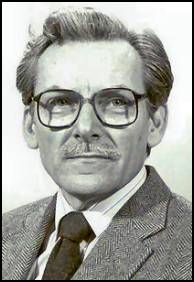Delton Franz
Delton Franz served as director of the Mennonite Central Committee office in Washington, DC for 26 years.
Delton Franz Speaks at the Church of the Saviour (1974)
Biography is from A Common Place, from the Mennonite Central Committee, 4/3/2013
 At the peak of the civil rights movement and protests against the Vietnam War in 1968, Franz moved to Washington, D.C. from Chicago to open the new MCC Washington Office.
At the peak of the civil rights movement and protests against the Vietnam War in 1968, Franz moved to Washington, D.C. from Chicago to open the new MCC Washington Office.
Franz served as MCC’s primary liaison to the U.S. government, bringing the concerns of MCC workers and partners around the world to policymakers on Capitol Hill. He retired in 1994 after 26 years as director. He died in March 2006.
“For him the first move of political action was always to clarify and deepen the church’s understanding of issues of justice and peace,” said John Stoner, former MCC U.S. Peace Section director. “The second move was to witness that understanding to the powers in Washington.”
Before arriving in Washington, D.C., Franz had been co-pastor of the Woodlawn Mennonite Church in southside Chicago with Vincent Harding from 1958 – 1961.
“I think that what I recognized, and what people of that community recognized was that Delton was a very compassionate person. That compassion was the deepest driving force of his life,” said Vincent Harding, who is now director of Veterans for Hope in Denver, Colo.
“And what we were doing was something that did not have any models,” Harding said of their work together as pastors at Woodlawn, an inter-racial church. “At any point I felt he was trying always to be both straight forward and gracious and open in our working together.”
Harding recalled how Franz’s openness to exploring the situation at Woodlawn was what helped create the circumstances for multi-racial leadership in the church.
Franz and Harding were two of a group of five men, three white and two African-American, who traveled together to the southern states in 1958 and eventually met Martin Luther King.
“They were very exciting years and I think we saw that some things were possible that many people thought impossible, with people coming together from very different backgrounds and finding some common ground,” Harding said.
Once in Washington Franz “worked tirelessly for the most inclusive definition of legal conscientious objection, so that no person, whatever their religious persuasion or lack thereof, was denied the right to refuse to kill people,” Stoner said.
Under Franz the Washington office broadened the Mennonite voice to government to include civil rights, international peace and justice issues and human rights.
“Delton understood and communicated the witness of the Bible for peace and justice overlooked by many,” Urbane Peachey, former MCC International Peace Section director said.
“He was a compassionate advocate for the dispossessed, and for the cause of human rights,” Peachey said. “His ability to understand and describe oppressive government systems was a real gift to our times.”
Franz was a founding member of Churches for Middle East Peace, a coalition of 20 religious groups. He attended the Oslo agreement signing ceremony at the White House in 1993. He also focused on U.S. policies toward Latin America and traveled widely throughout the world.
“Delton was a subtle teacher whose lessons have staying-power. He embodied kindness, dedication and peace-living, said Corinne Whitlatch, Executive Director of Churches for Middle East Peace. “Still today, many years after his time of leadership, I am strengthened by his example and my memories.”
Born December 12, 1932, in Hutchinson, Kan., Delton Franz was the son of John J. Franz and Sara Siemens Franz.
He graduated from Bethel College in 1954 and married Marian Claassen in June of the same year. After pastoring for a year in Kansas, the two moved to Chicago to attend Mennonite Biblical Seminary. He was pastor of Woodlawn Mennonite Church on Chicago’s South side from 1955 to 1968. He spent 1964 in New York City at Union Theological Seminary, earning a Master of Sacred Theology degree.
Franz’s life work centered on peace making and race relations. He and his, Marian, were active in the Civil Rights Movement of the 1960s. In his work with MCC, he worked tirelessly to assure justice for all people regardless of nationality or faith. He had been a board member of the National Interreligious Board for Conscientious Objectors (now the Center on Conscience and War).
